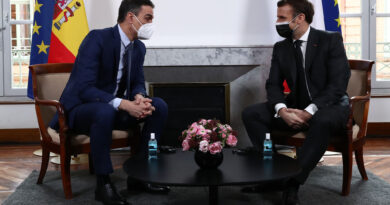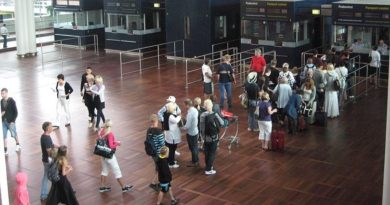Coronavirus brings borders back in Europe
On March 13th the World Health Organization declared Europe the epicenter of the coronavirus pandemic. Originated in China, the outbreak has so far hit about half a million people and claimed some 30,000 lives across Europe, with Italy, Spain and Germany reporting the highest number of cases.
Announcing drastic measures to contain the spread of the virus, German Chancellor Angela Merkel has defined the epidemic the biggest challenge the country has faced since World War II.
EU governments have responded to the crisis in different ways. Most countries have imposed lockdown measures to limit social contacts. Many have also reintroduced border checks.
When the emergency started in Italy, Austria imposed border controls and banned anyone without a virus-free certificate. Soon after, Romania decided to quarantine people travelling from the worst hit areas. Malta established a travel ban on the countries with the highest rates of infection. The Czech Republic, Cyprus, Denmark, Hungary, Latvia, Lithuania, Poland, Slovakia and Spain shut their borders. The Czech Republic and Belgium also prohibited their citizens to travel abroad.
By April 1st, 13 countries (Belgium, Spain, Germany, Norway, Portugal, Switzerland, Lithuania, Austria, Estonia, Hungary, Poland, the Czech Republic and Finland) of the 26 participating in the passport-free Schengen Area had announced the reintroduction of border controls because of the epidemic.
“Let me assure you: for someone like me, for whom freedom of movement and movement were a hard-won right, such restrictions can only be justified in absolute necessity. They should never be taken lightly and only temporarily imposed in a democracy, but they are indispensable now to save lives.”
Angela Merkel, 18 March 2020
Border checks in Schengen states are possible in case of a “serious threat to public policy or internal security.” France and Sweden, for instance, had border controls in place already before the crisis because of terrorism threats. But closures under the Schengen Agreement “must remain an exception,” respect the “principle of proportionality” and be “limited in time”.
Despite such principles, several countries have kept extending closures since the 2015 migration crisis. This is why, as part of her work programme, EU Commission President Ursula von der Leyen had promised to “return to a fully functioning Schengen area” with the reform of the EU asylum system and the strengthening of EU external borders.
Closure of the EU borders
Events, however, took a different direction and EU countries started to put up borders again to limit the spread of the virus. In some cases, this has led to chaos.
Because of Poland’s strict travel ban, long queues of trucks formed at the German-Polish border and citizens of the Baltic states (Lithuania, Latvia and Estonia) got stranded until ships were sent to Germany to bring them home.
Romanian and Bulgarian citizens also found themselves blocked at the Hungarian border until the government in Budapest gave them permission to reach their countries.
In the attempt to coordinate the European response to the crisis, von der Leyen proposed on March 16th to ban all non-essential travel from outside the EU. Endorsed the next day by the leaders of EU countries, the EU travel ban will be in place for an initial period of 30 days.
Citizens from Iceland, Liechtenstein, Norway and Switzerland (which are not EU members but are part of the Schengen Agreement), and from the United Kingdom (which is in the Brexit transition period) are excluded from the ban and can still travel across the EU.
But before starting any journey, authorities recommend to seek guidance from the relevant embassies or Ministries of Foreign Affairs (see the information pages of Austria, Belgium, Bulgaria, Croatia, Cyprus, the Czech Republic, Denmark, Estonia, Finland, France with Q&A, Germany, Greece, Hungary, Iceland, Italy with Q&A, Ireland, Latvia, Lithuania, Luxembourg, Malta, the Netherlands, Norway, Poland, Portugal, Romania, Spain, the United Kingdom, Slovenia, Slovakia, Sweden, Switzerland).
All countries recommend avoiding unnecessary travels. As tempting as it may be to join family members elsewhere, government guidance says residents in another EU member state should stay where they live if possible, and follow local advice.
Citizens who were travelling outside the EU are requested to return to their home country as soon as possible, as transport connections are increasingly limited. Once back home, several countries impose a 14-days quarantine and a series of different lockdown rules.
Most airlines have also grounded their planes, and the Eurostar, railways and ferries operate a reduced service. In some countries, only national carriers continue to ensure a basic transport service.
Repatriation from outside the EU
As EU countries organise repatriation flights to bring back their citizens stranded abroad, the EU civil protection mechanism has been activated too.
The mechanism allows EU member states and 6 other participating countries (Iceland, Norway, Serbia, Montenegro, North Macedonia and Turkey) to call for help and support each other in a crisis. The EU Commission helps coordinate and contributes to the costs of repatriation flights carrying people of more than one EU country.
The contact point for EU citizens stranded abroad are Embassies of EU states, which can assist other EU nationals where their country does not have a diplomatic presence.
Since the beginning of the outbreak, around 250,000 people have been brought back to Europe with flights organised by member states and 4,384 through the EU mechanism, the Commission reported.
Belgium brought EU citizens back from Tunisia, Germany from Egypt, Morocco, Tunisia, the Philippines, Argentina and the Dominican Republic, Latvia from Georgia, Lithuania from Indonesia, the Czech Republic from Egypt, Vietnam and the Philippines, Poland from Chad, Sudan, Nepal and the Maldives, and the United Kingdom from Peru.
Who can travel?
Despite travel restrictions, some people are still allowed to move across the EU borders. Citizens of the EU or Schengen associated countries and their family members, nationals of San Marino, Andorra, Monaco and the Vatican, and non-EU nationals with a residence permit and their dependents can travel for returning home or “imperative” family reasons.
Certain workers from outside the EU are also exempt, for example healthcare professionals, health researchers, frontier workers, seasonal agricultural workers, transport personnel, diplomats, staff of international organisations, military staff, humanitarian aid workers and civil protection personnel in the exercise of their functions, as well as asylum seekers.
As regards internal EU borders, the European Commission urged the opening of “green lanes” for the transport of goods, allowing the free movement of hauliers.
“We need to protect people from the spread of the virus, and at the same time, we have to make sure that we maintain the flow of goods. We therefore propose so-called green lanes, fast lanes, to give priority to transport of goods, like medical goods, perishable goods, notably food and emergency services,” said Ursula von der Leyen.
The European Commission also developed a non-binding list of “critical workers” whose ability to move is deemed “essential”. In addition to transport workers, these include health professionals, child and elderly care workers, scientists in health-related industries and medical devices, firefighters and police officers, and persons working in the food sector.
EU countries should also allow frontier workers (people who live in a country and work in another) to continue crossing borders if their presence at work is still allowed in the host member state. These workers should benefit from “free and fast procedures to ensure a smooth passage”.
About 1.5 million people have to cross an EU border to go to work, and the share is particularly high in Slovakia (5.5%), Luxembourg (2.7%), Croatia, Estonia and Belgium, according to think tank Bruegel. In Luxembourg, two thirds of healthcare workers commute from neighbouring countries. “If we close the borders, we might as well close the hospitals,” Luxembourg Prime Minister Xavier Bettel has said.
The European Commission also called on EU member states to allow the movement of seasonal workers, especially in the agricultural sector, as several countries face labour shortages due to the crisis.
Nicolas Schmit, EU Commissioner for jobs and social rights, said: “Thousands of women and men working hard to keep us safe, healthy and with food on the table need to cross EU borders to go to work. It is our collective responsibility to ensure that they are not hindered in their movement, while taking every precaution to avoid further spread of the pandemic.”
Erasmus+ students
For participants in the Erasmus+ programme or the European Solidarity Corps who had to terminate their experience and return home, the European Commission said their expenses will be covered and additional ones, e.g. for longer stays or travel costs, may be refunded. Deadlines for participation in the programmes have also been extended.
Many people may be longing for the moment they can resume their studies or professional activities, or to see their families again. But in the meantime, “we need to do more to reduce the huge pressure on our healthcare system,” von der Leyen said. “The less travel, the more we can contain the virus.”
Claudia Delpero © all rights reserved.
Europe Street News is an online magazine covering citizens’ rights in Europe. We are fully independent and we are committed to providing factual, accurate and reliable information. We believe citizens’ rights are at the core of democracy and information about these topics should be accessible to all. This is why our website and newsletter are available for free. Please consider making a contribution so we can continue and expand our coverage.




